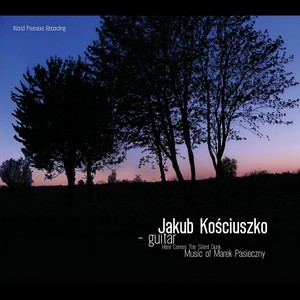
Here Comes The Silent Dusk. Music of Marek Pasieczny.
- 流派:Classical 古典
- 语种:其他 纯音乐
- 发行时间:2010-04-10
- 唱片公司:Qbk
- 类型:录音室专辑
- 歌曲
- 时长
简介
From the reviews: The excellent guitarist Kościuszko is revealed as a very talented young who has the uncommon capability to express, through his guitar, deep and dense emotions, and to catch and underline details and shades like few guitarists can. Review: ••••• (out of five) Ermanno Brignolo, Sei Corde Magazine Kościuszko is a fine player, without discernible technical or interpretative limitations. Al Kunze, Guitar Foundation of America, Soundboard Magazine Marvellous CD! You are playing as if you are telling an exciting story. There are so many magical moments. Congratulations! maestro Zoran Dukić An extraordinary sonoristic imagination, a source of ultra rich set of colours, dynamic and articulation nuances. prof. Marek Dyżewski, Polskie Radio Jakub Kościuszko perfectly feels the inspirations and expresses them in premeditated, tasteful and authentic playing. Jowita Dziedzic-Golec, RMF Classic, „Twoja Muza” Magazine Jakub Kościuszko (…) is an excellent interpreter of Pasieczny`s music, a sensitive virtuoso. In a breathtaking, perfect way he plays the complicated passages and in the singing parts he demonstrates subtlety of articulation, caring about the sound colour and dynamic nuances. Interpretation: ••••• (out of five) Hanna & Andrzej Milewski „Hi-Fi i Muzyka” Magazine A beautiful and very important CD in the history of Polish guitar. I sincerely recommend it! Zbigniew Dubiella, laguitarra.pl Jakub Kościuszko, award-winning guitarist, graduate of the Royal Conservatory in The Hague (guitar class of maestro Zoran Dukić) and Academy of Music in Wroclaw (class of prof. Piotr Zaleski), has recorded a debut CD "Here Comes The Silent Dusk." The CD is a World Premiere Recording of pieces written by Marek Pasieczny, about whom Krzysztof Penderecki said: 'Hope for the polish modern repertoire of classical guitar'. “I do consider Marek Pasieczny as a highly inspired guitarist and composer. His musical world deeply touches me by its great personality and originality. He is what I call a free artist.” ROLAND DYENS - guitarist and composer, Teacher at the Conservatoire National Supérieur de Paris (Paris, France October 2008 "I decided to record a CD with music of Pasieczny because I find a lot of incredible fresh ideas in it" - says Jakub Kościuszko - "It`s totally extraordinary in the guitar repertoire, it has a perfect balance between modern and impressionistic-jazz sound. The composer doesn`t try to shock the listener, he shows fantastic musical landscapes instead." "My adventure with composing began primarily with fascination by one of three main elements of music - harmony. The sense of ‘harmonic content’ makes the first composition on the CD – ‘The Fields in Polanówka’, dedicated to my father – meaningful. The piece comes from a series of my four early works for guitar (other pieces are ‘Two Stories...’, ‘Aquarius’ and ‘Cool Night Lights’). Harmony integrates the piece and synthesises the melodic progress and by combining these two elements I was able to create an impressionistic synthesis of harmonic color. It was an obvious ‘reaction’ to my musical fascinations with impressionism and jazz in that time. The next piece on the CD is ‘Hommage a Aleksander Tansman’ (suite) – commissioned and dedicated to Anna Pietrzak. The inspiration here was polish folk music, strongly present in the works of A. Tansman. Fascination by folk music is fully represented in my later works (‘6 folk melodies’, ‘9 Miniatures’ or ‘Concerto Polacco’ for two guitars and orchestra). As well as every ‘Hommage’, this one is a result of enchantment for music of a particular composer. Pieces which have the most influence here were the Second Piano Concerto (‘pianistic’ way of treating the material: perpendicular harmony, flat modes, etc.) and Cavatina for solo guitar. After extremely traumatic events from last year, this suite (especially ‘Nocturne Funebre’) has gained a new dimension for me: a great importance and significance. ‘Threnody of The Victims of Bełżec 1941-42’ – written for Jakub Kościuszko, is the last composition on the album. It is my biggest and most complex piece (beside Sonata ‘Eastern’ for cello) for solo instrument. Bełżec is a village 40 km far from my hometown and has always aroused extreme emotions in me through its martyrological history connected with the German Nazi death camp that operated there. This piece is based on the Jewish anthem ‘Hatikvah’ (‘The Hope’), and is a set of several loose variations. In modern music, functionality and opposition of consonance and dissonance quit being a rule for integration – in the case of ‘Bełżec’ it is the language of ‘loose atonality’, the vertical factor stops working as a principle of connecting the melody. It is not a coincidence that the listener feels the disintegration of melodic progress at the first moment. Therefore, the material that is binding the whole lasting over 20 minutes atonal piece, is a very simple, tonal and easily recognizable melody. The essence of these variations is a pure sound form, organisation of sounds and their sequence in time. The structure of the sound material is far more important than ‘ars inveniendi’ - that is musical thought/theme. Although the ‘Hatikvah’ theme is subject to the laws of ‘artis combinatoriae’ (formation), more important is what is actually happening with it through the form of loose variations, rather than what exactly the theme/melody is." Marek Pasieczny







